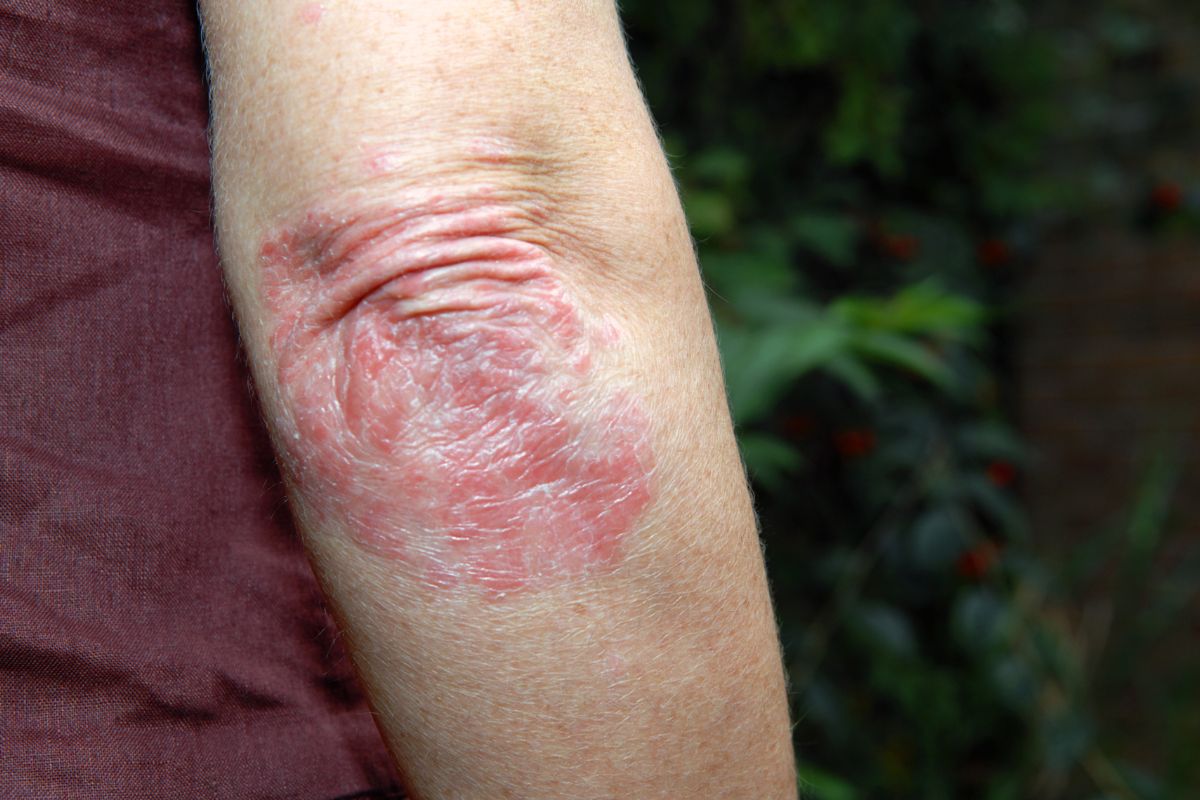Psoriasis is a chronic disease that causes flaky patches of skin which leads to scales forming on the surface of the skin.

If you struggle with psoriasis, you might be wondering: Can coconut oil help treat psoriasis?
In this article, I will explore some important information about coconut oil, including whether coconut oil can help treat psoriasis.
Let’s get into it.
What Is Psoriasis?
Psoriasis (see also ‘10 Best Psoriasis Shampoos For Scalp Psoriasis‘) is a disease that causes itchy, scaly, as well as painful plaques on the surface of your skin.
While psoriasis can appear anywhere on your body, it is most commonly found on the scalp, elbows, and knees.
While there is no cure for psoriasis, there are many ways in which your doctor can help you to manage your symptoms with various medications.
In addition to this, there are various home remedies that may help ease your symptoms, including coconut oil.
What Is Coconut Oil?
Coconut oil is taken from the fruit of a coconut. Coconut oil has a variety of purposes but is primarily used in cooking as a substitute for traditional cooking oils, as well as a skin moisturizer.
Coconut oil contains lauric acid, a fatty acid that is known to reduce:
- Inflammation
- Viruses
- Fungus
- Harmful microbes
Coconut oil can therefore be used as a natural remedy for various conditions, including psoriasis.
That being said, just because coconut oil is commonly viewed as a home remedy does not mean that it will be effective for you.
Can Coconut Oil Help Treat Psoriasis?
As I’ve mentioned above, coconut oil can be a wonderful natural remedy and can also be added to the treatment plan for your psoriasis.
Coconut oil is a gentle ingredient, and has anti-inflammatory properties that might help to ease the pain that your psoriasis causes.
Coconut oil can be used to help moisturize your skin as well as the scales on your skin caused by psoriasis.
However, while coconut oil can be used to help treat your psoriasis, it is not enough to act as a solution on its own for your skin condition.
Bearing this in mind, coconut oil may offer you some relief when you’re struggling with psoriasis, but it shouldn’t be used in place of the treatment recommended by your doctor.
You will also need to keep in mind that home remedies may help some people and not others. While coconut oil is unlikely to make your condition worse, it may not be effective for everyone, and could even cause a reaction if you’re allergic to it.
It is also important to mention that using coconut oil has the potential to interfere with any topical treatments that you have been prescribed by your doctor, so always ask them before you use it.

How Does A Doctor Treat Psoriasis?
It’s important to reiterate that there is no cure for psoriasis. That being said, there are a range of treatments that can help improve the appearance of psoriasis, and to help manage the disease on a long term basis.
There are no magical treatments that are going to make your psoriasis disappear overnight. That being said, in the majority of cases, a topical cream, such as vitamin D analogues, is often used as the first treatment for psoriasis.
If the topical creams tried are not effective, or your psoriasis is particularly severe, phototherapy might be used instead. This treatment involves exposing the affected skin to ultraviolet light.
If you’re struggling with psoriasis, it’s essential that you seek professional advice from your doctor.
They will be able to take a look at your skin and from there can decide the best treatment for your psoriasis based on the severity of your condition.
While your skin can feel very dry and flaky, it’s important to not scratch your psoriasis, as this can lead to your skin becoming brittle, damaged, and can lead to infection if bacteria gets into it like an open wound.
Can Any Other Oils Help Treat Psoriasis?
There are a few other oils that you can try if you’re interested in natural ways of treating your psoriasis.
These oils include but are not limited to:
Tea Tree Essential Oil
Psoriasis can become itchy, which can induce you to scratch your skin when you’re awake and half asleep at night.
If you scratch your psoriasis, you might want to consider applying tea tree oil to the affected area to help fight infection as well as ease inflammation.
That being said, you should be wary of using too much tea tree oil as it’s very strong. If you do use too much tea tree essential oil, it could dry your skin and could even worsen your psoriasis.
Bearing this in mind, you should always dilute the oil with a carrier oil, such as castor oil and only use a very small amount when applying it to the skin to remain on the side of caution.
Lavender Oil
Lavender oil is another oil that is used for numerous conditions, from grazes and scrapes to muscle pain and headaches. It can even be used to reduce or ease the emotional triggers of psoriasis.
Additionally, lavender oil may also help to reduce the itching caused by itching when mixed with a lotion and applied to the skin.
Prioritizing your skin health is essential when you have a disease like psoriasis, so be sure to consult with your doctor before you attempt to use essential oils on your skin.
This will help to ensure that you don’t cause your psoriasis to flare up, and worsen your condition by mistake.
In Summary
So, there you have it!
While coconut oil may offer you some relief when you suffer with psoriasis, it shouldn’t be used in place of the treatment that has been recommended to you by your doctor.
I hope this article has given you a better idea of using coconut oil as a home remedy for your psoriasis.
If you’re struggling with your psoriasis, be sure to call your doctor or healthcare professional for a second opinion and to seek the necessary treatment.
- Understanding Male Reproductive Health: A Complete Guide - February 2, 2025
- Simple Healthy Skin Habits for Radiant Skin - December 6, 2024
- Unlocking the Connection Between Nutrition and Mental Health - December 3, 2024








